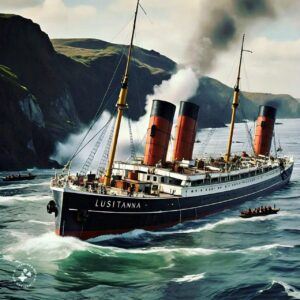
CHAPTER 12
Sink the Lustitania!
In 1915, the world stage was set with tension that would spark a cataclysmic shift in global dynamics. European powers were entrenched in what was to become one of the bloodiest conflicts in history – the First World War. The ocean, a vast expanse that connected nations, became not just a commercial thoroughfare but a battleground.
The alliances and conflicts that defined this period were like kegs of gunpowder, awaiting a single spark to explode. Central Powers, led by Germany, squared off against the Allies, including Britain and France, in a high-stakes game of naval dominance. The seas, once peaceful trade routes, were now patrolled by warships and clouded with the threat of underwater mines and torpedoes.
In this charged atmosphere, civilian ocean liners were often repurposed to aid war efforts. They carried not just passengers, but also munitions and supplies essential for the front lines. The Lusitania was one such vessel – a luxurious liner that epitomized the golden age of transatlantic travel, yet it also transported materials deemed contraband by warring nations.
Here we sketch the Lusitania’s portrait before its untimely descent. We recall its majesty and its role during a time of war – a pawn in a larger strategy, a casualty of unstated but well-known risks of sailing through war-torn waters. By understanding these critical historical elements, we set the stage for a deeper exploration in the following section, where Chapter 12 of ‘The Creature from Jekyll Island’ offers an intriguing perspective on the financial underpinnings that may have sealed the fate of this iconic ship and its passengers.
Unraveling the Mysteries: Chapter 12 Insights
In my quest to uncover the full story behind the sinking of the Lusitania, I found key insights in an unexpected source: a book about monetary policy titled ‘The Creature from Jekyll Island’. Chapter 12 of this book provides a captivating examination of how financial institutions may have indirectly or directly played a role in the events leading up to the Lusitania’s demise. You decide.
The author of ‘The Creature from Jekyll Island’ challenges readers to consider the broader economic context of the time. It was a period where monetary policy was not merely a matter for central banks, but a cog in the machine of war funding. The complex web of loans and international debt could, as suggested, influence nations’ stances and actions during the war, including those concerning trade and military engagement.
The intertwining of finance and wartime decisions becomes particularly relevant when considering the Lusitania. As the chapter describes, financial titans of the era were deeply invested in the outcome of World War I. The book suggests that these individuals may have had more than a passive interest in the unfolding events—a perspective that adds a layer of intrigue to the ship’s fateful journey.
Understanding these financial undercurrents sheds new light on why the British liner, despite the dangers known to be lurking in the waters it sailed, may not have had the stringent safety measures one would expect. The book posits an unnerving hypothesis that there were shadowy motives at play, making the Lusitania’s trek across the Atlantic a risk of calculable sacrifice in a larger game of war. This is what the Banking cartels have been doing for centuries, funding both sides of the war. That way it doesn’t matter who wins, the cartel already won. The cartel get the resources of the losing party and on to the next war.
May 7, 1915: The Day the Lusitania Fell
On a seemingly typical spring day, the RMS Lusitania, a British ocean liner, was en route from New York to Liverpool. It’s important to remember that at this time, the waters were a silent battleground with German U-boats patrolling the North Atlantic, enforcing a military tactic known as unrestricted submarine warfare.
Among the passengers on board were influential business leaders, writers, artists, and individuals from varying walks of life, each with a unique story. The human aspect of this tragedy often gets overshadowed by the political and military discussions, so it’s crucial for us to honor their narratives.
The German submarine U-20, commanded by Walther Schwieger, had Lusitania in its sight. Without warning, a torpedo was launched, making a direct hit on the starboard bow. The explosion that followed was catastrophic, engulfing areas of the ship in flames and sending debris into the chilling waters.
Despite gallant rescue efforts, Lusitania succumbed to the damage and sank in a mere 18 minutes. Nearly 1,200 lives were lost in this horrifying event. The ripple effects of the sinking were felt around the globe, shaping public opinion and policy in ways that would echo through history.
The Sinking of the Lusitania: Consequences and Legacies
When the Lusitania sank on May 7, 1915, it was not only the lives of 1,198 individuals that were irrevocably lost but also a certain naivety of the time about the nature of modern warfare.
The public outrage that followed in the United States was palpable. Americans who had preferred to remain uninvolved in the overseas conflict were suddenly confronted with the horrifying reality that war could reach even neutral citizens. This sea-change in public sentiment didn’t thrust the U.S. into World War I immediately, but it certainly paved the way for increased support for the Allies.
Beyond the immediate emotional impact, the Lusitania’s demise also precipitated significant changes in maritime law. One of the most telling was the eventual agreement to declare certain ships as hospital ships, which should be immune from attack, marking early steps towards the regulations we see today that aim to protect non-combatants.
In American policy circles, the sinking intensified debates over national security and defense preparedness. It underscored the importance of having a strategic military and economic position in the world, a lesson that would influence U.S. foreign policy for decades to come.
While the aftermath of the tragedy led to practical policy changes and reshaped international conventions, it is the human stories that continue to captivate and educate. Each passenger had a story, and their collective legacy is a reminder of the costs of war, the importance of diplomacy and the pressing need to preserve humanity within the chaos of global conflicts.
As we look back on the sinking of the Lusitania, it’s crucial to consider not just the event itself but the waves it created in shaping the course of history. It stands as a stark example of how a single incident can alter the trajectory of nations and the lives within them.
But why did it happen? To finance the early stages of World War I, England and France had to borrow heavily investors in America and they selected the House Of Morgan ( JP Morgan) as sales agent for their bonds. Morgan also acted as their U.S. purchasing agent for war materials, once again profiting from both sides, when money is borrowed and when money is spent! The war was going badly for the allies and it became really hard to sell the trash bonds which meant Morgans cash flow would stop. Morgan could not let that happen so the only way to save the British Empire the United Sates government had to pay the bill like we always do, and America had to be brought into the war like we always do.
Morgan had created a shipping cartel including Germany’s fleet, he had a near monopoly on the high seas. The Lusitania was competition to the Morgan Cartel. The Lusitania was built military style and was registered with the British Admiralty as an armed auxiliary cruiser. She carried passengers as a cover to conceal her real mission which was to bring contraband war materials from the United States. There we go again, supplying weapons to other countries so they can use it on us later. Wilson knew and people in his administration knew. The German embassy tried to publish a warning to American passangers, the State Department intervened and prevented newspapers from printing it.
The British knew that to draw the United States into the war would mean the difference between defeat and victory. Even if they had to sacrifice one of her great ships with Englishmen abroad. But the trick was to have Americans on board also in order to create the proper emotional climate in the United States. How many times have we seen this Secret Science, 911 maybe , Ukraine, and The Middle East the most recent. Just think about it. The Secret Science is all around us.
Chapter 11 The Rothschild Formula
Chapter 13 Masquerade In Moscow
